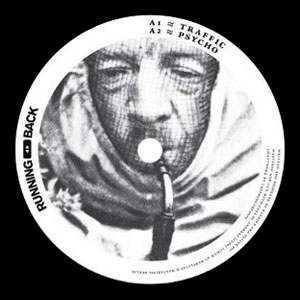Raudive Traffic EP
The latest EP from 18-year production veteran Oliver Ho might be subtitled something like “Reflections […]

The latest EP from 18-year production veteran Oliver Ho might be subtitled something like “Reflections on the Banger.” This doesn’t mean that the record offers a SND-style intellectual deconstruction, but rather pieces realized with the casual, rapid control of sketches executed by a seasoned artist. The focus of this EP for Running Back is on Raudive’s draftsmanship—his ability to rattle off a stylish study of a subject from various angles without undue hardship. There is no bigger picture to Traffic, but the only real downside is that, at times, the EP feels authorless in the way tech-house records tend to do.
“Traffic” kicks things off with the kind of muscular brashness that Night Slugs has dominated for the past couple of years. Despite the inherent dirtiness of the track’s guttural piano note, clomping toms, and smeared vocal sample (something, appropriately, to the effect of “Break through the wall”), “Traffic” is every bit as glossy, in its way, as something like Jam City’s “The Courts.” The EP’s other three tracks (the digital version includes, additionally, an alternate version of “Beams” and the DJ tool “Traffic Beats”) follow in the same vein, as if Ho was trying to make of classic-house sounds something bruising, verging on larger than life. “Psycho” is the exception. Done up in a more laid-back fashion, its strutting grove, slanting sawtooth buzzing, and sampled “Yeah!” that must be Planningtorock—that parodic, grating Julia Child opera voice couldn’t belong to anyone else—don’t lead anywhere in particular.
This record’s b-side addresses the first side’s inconsistency but otherwise continues the burly vibes already underway. Another glowering voice, this time muttering “Slave,” finds its way onto “Relentless.” The voices that respond, in watery tones, “Get free!” are less than convincing, but the track’s crunchy layers of hi-hats and various techno sequences are textured enough to keep it from becoming generic mid-set filler. Traffic concludes on its strongest moment with “Beams.” Even if the Geiger-counter pips that seem to strain the rhythm here are lifted from Gui Boratto’s “Mr. Decay,” the tapered, slapping sounds around it unfold slowly enough to keep the listener’s attention focused on what’s coming next.

